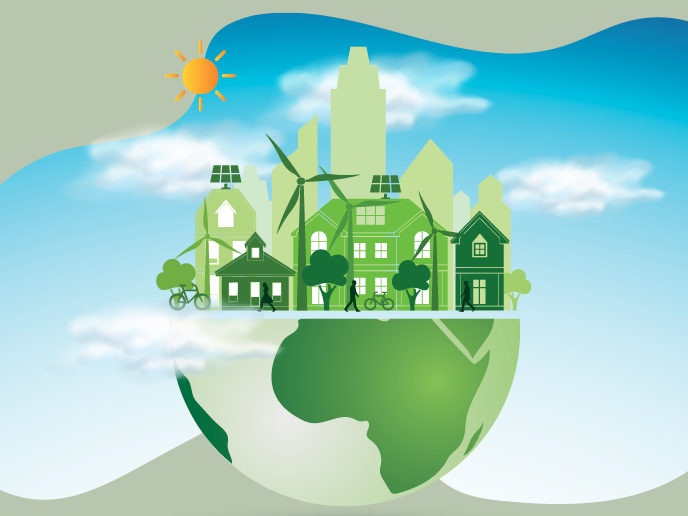Local clean energy transition
At a global level, cities consume over 65 % of the world’s energy and account for more than 70 % of global CO2 emissions. Helping cities reduce reliance on fossil fuels and become more energy efficient will curb harmful emissions and lead to cleaner air, safer transport and less congestion and noise for their citizens. With the energy price crisis – following the invasion of Russia in Ukraine – implementing more ambitious clean energy and energy efficiency goals is more important than ever. The European Commission has put forward the REPowerEU plan to achieve further energy savings, diversification of energy supplies, and accelerated roll-out of renewable energy to replace fossil fuels in homes, industry and power generation. In this context, cities and regions can be pioneers in accelerating the clean energy transition by rolling out energy efficiency and renewable energy measures, mainstreaming clean energy policies into their planning mechanisms and attracting investments that will support them in implementing their plans. As the level of governance that is closest to citizens, municipalities and local authorities play a pivotal role in the clean energy transition. For the move to a more carbon neutral society to be sustainable and inclusive, local actors must have the knowledge and resources to reduce emissions and implement sustainable solutions.
Initiatives and funding support for cities
Several initiatives and funding opportunities exist at the European level to help cities achieve their clean energy transition goals and provide more sustainable services for their citizens. The Horizon 2020 Energy Efficiency programme (2014-2020) and its successor, the LIFE Clean Energy Transition programme (2021-2027), provide funding for a wide range of activities towards an energy-efficient, renewable energy-based, climate-neutral and resilient economy. Many of those actions target the local and regional levels across the European Union, working on long-term energy planning, deep capacity building, support to the EU Covenant of Mayors for Climate & Energy, mobilising investment, alleviating energy poverty, changing markets and regulations, and much more. The European Commission’s Cities Mission is working with local and regional authorities, citizens, businesses and investors to deliver 100 climate-neutral and smart cities by 2030. Several calls from the Horizon Europe programme support this important goal. These cities will act as experimentation and innovation hubs to inspire and enable all European cities to follow suit by 2050. Founded in 2008, the EU Covenant of Mayors for Climate & Energy (CoM) brings together thousands of European local governments voluntarily committed to implementing EU climate and energy objectives. The Covenant works based on a municipality’s Sustainable Energy and Climate Action Plan (SECAP), a key document that shows how a local authority will reach its commitments towards 2030 and beyond. The annual Conference Covenant of Mayors Investment Forum Energy Efficiency finance Marketplace showcases successful initiatives to finance sustainable energy and climate adaptation, presented by practitioners to practitioners. The conference brings together cities, financial institutions and other actors to exchange good practices and successful solutions to common challenges. The projects in this Results Pack highlight activities that support cities with shorter-term implementation as well as long-term goals and ambitions for their clean energy transition. The aim is to accelerate adoption of energy efficiency measures, deployment of clean energy solutions and overall reduction of the CO2 emissions at the local level.
Fourteen projects targeting the local level
In cities, buildings are among the largest emitters of CO2. The RenoBooster and PadovaFIT Expanded projects developed a one-stop shop for the refurbishment of private residential buildings in Vienna, Austria, and Padua, Italy, respectively. Also focusing on renovation of buildings, BUILD UPON2 developed an impact framework that paves the way towards a harmonised monitoring of local and national retrofitting activities. Old heating and cooling systems in buildings are also a major climate change culprit. The DecarbCityPipes 2050 project provides seven cities with the skills and knowledge needed to decarbonise heating and cooling in buildings by 2050. PRODESA helped municipalities in Athens, Greece, undertake energy efficiency improvements in public buildings, while SURE2050 put forward a real estate management strategy to make public buildings in Flanders, Belgium, more climate neutral. Through round-tables, meetings and workshops, C-Track 50 mobilised and supported public authorities at the local and regional levels, enabling them to develop, fund and implement new or improved SECAPs, while CEESEU brings together 11 partners from 10 Central and Eastern European countries to build the capacity of public administrations to develop SECAPs. IMPLEMENT introduced the European Energy Award (eea) quality management and certification system in four partner countries to improve their energy and climate policy measures. In a similar vein, CoME EASY linked and synthesised the many available instruments and tools supporting local authorities, in particular the CoM and the eea. To help European municipal energy innovators take the first steps in the green transition, mPOWER and MULTIPLY developed peer-to-peer learning programmes, with the latter encouraging local authorities to take up integrated urban planning measures at district level. Mobilisation of private sources is crucial to putting all of Europe on the path to energy transition. EUCF helps municipalities and local authorities to mobilise funding to realise their ambitious energy and climate plans while ManagEnergy aimed to make local and regional energy agencies leaders in the energy transition and to increase sustainable energy investments in Europe.



